28//writing is the only thing i do tips tropes advice requests concrit references lists all the good stuff is here beware mod is unhinged cover art by slipperycactus1main: daddyellis
Don't wanna be here? Send us removal request.
Text
some fucking resources for all ur writing fuckin needs
* body language masterlist
* a translator that doesn’t eat ass like google translate does
* a reverse dictionary for when ur brain freezes
* 550 words to say instead of fuckin said
* 638 character traits for when ur brain freezes again
* some more body language help
(hope this helps some ppl)
239K notes
·
View notes
Text
REMINDER: shoulder dislocations are boring everyone does it, if you wanna add some spice to life, dislocate a hip. it's just as fixable as long as your characters have slight knowledge (give one of them sports medicine as a minor in college) and it took me five chapters to resolve so hey, dislocate the hip, its fun.
10 Non-Lethal Injuries to Add Pain to Your Writing
While lethal injuries often take center stage, non-lethal injuries can create lasting effects on characters, shaping their journeys in unique ways. If you need a simple way to make your characters feel pain during a scene, here are some ideas:
Sprained Ankle
A common injury that can severely limit mobility, forcing characters to adapt their plans and experience frustration as they navigate their environment.
Rib Contusion
A painful bruise on the ribs can make breathing difficult and create tension, especially during action scenes, where every breath becomes a reminder of vulnerability.
Concussion
This brain injury can lead to confusion, dizziness, and mood swings, affecting a character’s judgment and creating a sense of unpredictability in their actions.
Fractured Finger
A broken finger can complicate tasks that require fine motor skills, causing frustration and emphasizing a character’s dependence on their hands.
Road Rash
The raw, painful skin resulting from a fall can symbolize struggle and endurance, highlighting a character's resilience in the face of physical hardship.
Shoulder Dislocation
This injury can be excruciating and often leads to an inability to use one arm, forcing characters to confront their limitations while adding urgency to their situation.
Deep Laceration
A cut that requires stitches can evoke visceral imagery and tension, especially if the character has to navigate their surroundings while in pain.
Burns
Whether from fire, chemicals, or hot surfaces, burns can cause intense suffering and lingering trauma, serving as a physical reminder of a character’s past mistakes or battles.
Pulled Muscle
This can create ongoing pain and restrict movement, providing an opportunity for characters to experience frustration or the need to lean on others for support.
Tendonitis
Inflammation of a tendon can cause chronic pain and limit a character's ability to perform tasks they usually take for granted, highlighting their struggle to adapt and overcome.
Looking For More Writing Tips And Tricks?
Check out the rest of Quillology with Haya; a blog dedicated to writing and publishing tips for authors! Instagram Tiktok
#writing community#writing tools#writer things#writing advice#creative writing#writers of tumblr#writeblr#novel writing#on writing
62K notes
·
View notes
Text
hot artists don't gatekeep
I've been resource gathering for YEARS so now I am going to share my dragons hoard
Floorplanner. Design and furnish a house for you to use for having a consistent background in your comic or anything! Free, you need an account, easy to use, and you can save multiple houses.
Comparing Heights. Input the heights of characters to see what the different is between them. Great for keeping consistency. Free.
Magma. Draw online with friends in real time. Great for practice or hanging out. Free, paid plan available, account preferred.
Smithsonian Open Access. Loads of free images. Free.
SketchDaily. Lots of pose references, massive library, is set on a timer so you can practice quick figure drawing. Free.
SculptGL. A sculpting tool which I am yet to master, but you should be able to make whatever 3d object you like with it. free.
Pexels. Free stock images. And the search engine is actually pretty good at pulling up what you want.
Figurosity. Great pose references, diverse body types, lots of "how to draw" videos directly on the site, the models are 3d and you can rotate the angle, but you can't make custom poses or edit body proportions. Free, account option, paid plans available.
Line of Action. More drawing references, this one also has a focus on expressions, hands/feet, animals, landscapes. Free.
Animal Photo. You pose a 3d skull model and select an animal species, and they give you a bunch of photo references for that animal at that angle. Super handy. Free.
Height Weight Chart. You ever see an OC listed as having a certain weight but then they look Wildly different than the number suggests? Well here's a site to avoid that! It shows real people at different weights and heights to give you a better idea of what these abstract numbers all look like. Free to use.
#these resources work for writers too#writing resources#height weight charts especially but the image stuff helps too with visualization#if youre a wonky visualizer like i am use these#on writing#creative writing#character building#character development
330K notes
·
View notes
Text

Frisson (The Ties That Bind Us)
Cross-Posted in case ao3 is ever down: here
a sudden feeling of excitement or fear, especially when you think that something is about to happen
"Did you really expect to find anythin’ but more darkness at the end of it all?"
"I found you."
--- Nick is a down-on-his luck accountant with a gambling issue who can't reconcile his divorce no matter how hard he tries. When the world ends around him, he makes a bet on Ellis, a young, hot-headed mechanic with a dark past and even darker interests, who is hellbent on reconnecting with his best-friend-or-lover Keith, Nick isn't entirely sure. When their journey south to safety leads them in direct conflict with a group of vigilante headhunters, Nick has to make a choice between the life he knew and the life he's built in this new fresh hell. When all the cards are on the table, will Ellis be a sure thing? Or is the darkness hiding inside him too much for Nick to bare? A tragic tale of two broken men traveling a twisted path together on their way to figure out what it ultimately means to be human.
Tags:

Thank you so much for supporting Frisson (The Ties That Bind Us)
As of Oct 03 2024 Frisson (The Ties That Bind Us) is COMPLETE. And we have a fancy new discord server!
I hope to see you all in the sequel, Cynefin (The Bonds That Divide Us)
#ao3#fanfic#left 4 dead 2#nellis#nick/ellis#only bottom!nick content on this blog sorry#nick x ellis#frissonfic
25 notes
·
View notes
Text
okay but what about the inverse
"I trust you with my life because you are full of darkness, ruthless and unhinged and ready to do whatever it takes, and I *know* I'm the one thing you will always protect."
But the opposite also, "I can't trust you with your own life because you are full of darkness, ruthless and unhinged and ready to do whatever it takes, and I *know* I'm the one thing you will always protect, even if it means sacrificing yourself."
Because THAT children, is the recipe for ultimate angst, whump and romance at the same time.
i think 'I trust you with my life but not your own' as a trope is one of the ones that can always fuck me up no matter what
#this is the reverse trope i used in frisson#writing tropes#character tropes#writing#on writing#writers#creative writing#writeblr#writers on tumblr#ao3 writer#fanfictions#ao3 author
73K notes
·
View notes
Text

30 notes
·
View notes
Text
Resources for Writing Sensitive Topics
As always, when writing about sensitive topics/injuries/illnesses, we encourage everyone to research and tag works appropriately. This is to ensure that the whump community can remain a safe space for everyone, as well as assist writers in creating well-informed works that avoid offending people and stereotyping, romanticising, or sensationalising hard topics.
Below are some links to resources we and others found useful - we'd like to thank the wonderful members of our community for helping us with finding great resources.
Blogs/Tumblr Posts:
@cripplecharacters - A whole blog dedicated to helping people write disabled characters.
^ A Guide to Writing Disabled Characters
@writingwithcolor - A whole blog dedicated to writing and resources centered on racial, ethnic and religious diversity.
^ Stereotypes and Tropes Navigation
Resources for Writing Injuries (Tumblr Masterpost)
Resources for Writing Sketchy Topics (Tumblr Masterpost - please note that a couple of links are broken due to the post being 7 years old, but many are still working!)
A guide to designing, drawing or writing characters who use mobility aids (Tumblr post)
Writing A Blind or Visually Impaired Character (Tumblr Post)
Independent Websites
Avoiding Stereotypes in Fiction: Characters with Mental Health Issues (WritersHelpingWriters)
How Do I Depict a Disabled Character Respectfully? (Fay Onyx, Mythcreants blog)
Respectfully Depicting a Character Adapting to a Disability (Fay Onyx, Mythcreants blog)
Writing Deaf Characters (T. Frohock, author.)
How to Write Deaf or Hard of Hearing Characters (Melanie Ashford, Science Fiction & Fantasy Writers Association)
How to Write a Blind or Vision Impaired Character (AllWriteAlright)
If anyone has any additional sources, feel free to share them in the reblogs/replies!
POST CONTRIBUTERS - Thank you!
@psychologeek - Thank you for sharing some of the primary resources with us, it helped us a great deal :)
3K notes
·
View notes
Text
The Best Writing Advice I've Ever Recieved
"There are no original stories. Only new ways to tell them."
On it's face, this might seem like terrible advice and so disheartening, and for me, it was. I asked so many follow up questions to expand on what my mentor meant by this, and he offered only this; 'we created every story there ever was before the beginning of time was recorded, before we could read or write, when we were sitting in caves casting shadows and craving pictures on the wall. Every archetype, every trope, every cliche, every character arc, every plot twist--- its already been done. So do it your way.'
For a long time, I thought this meant I needed to be unique, that I needed to literally find a new way to tell the stories I wanted to tell, which fit into tropes and archetypes and plot points I understood, and I agonized for hours twisting my ideas into every possible shape in order to make them as unique as possible-- and turning them into something completely incomprehensible.
I spent a lot of time stewing on this advice, trying to find my new way. Wondering, were there stories that hadn't been told? Could I be the one to finally figure out a way to tell a story that's never been done before? How do I tell my story in a way that doesn't remind anyone of anything else they've ever read?
And I focused on that. Guess what? The text was boring. Soulless. Contrite. Banal. Like the world's beigest pillow.
And if that last line struck you as familiar, it's popular from AMC's Interview with a Vampire right now, a fandom joke. And fandom is what taught me the thing I really needed to know from this advice; references aren't bad. Your media being akin to other media like it isn't a fault. I don't need to create a new story, I need to tell my own story, in my voice.
Telling a story in a your own way will always be new, will always be unique, will always be something that has never been done before; and to tell those stories in a way that resonates with us and the audiance, looking back on all the storytelling before us, and leaning on it rather than running away from it, using it to guide us, help us, hold our hands while we learn to sing with our own voice the song of generations and generations before that are all connected through storytelling---
that's what he was trying to tell me.
Your idea is good; it's been done before. That's okay; let that help you.
A story will be unique because you told it.
#creative writing#writeblr#rowanwrites#on writing#writers on tumblr#writing#writing tips#writing advice#how to write#creative process#book writing#novel writing#writerscommunity
41 notes
·
View notes
Text
Welcome to the Neighborhood
a L4D2 slice-of-life fanfic

WTTN is an AU idea that I just could not get out of my head. I have no idea how long it'll be, but I have a planned ending once I run out of hilarious situations to put these idiots into
cross posted on SquidgeWorld: here
I will be working on this project weekly or bi-weekly in between Frisson updates

6 notes
·
View notes
Text
it bothers me that you often don't really hear about people having a "favorite album" the way they might have a favorite movie or favorite video game
#Dreamland (2020) by glass animals that shit got me through the year#its such a vibe such a journey to listen to from start to finish
65K notes
·
View notes
Text





writers often make jokes about our search history accidentally looking very ominous or bloody, but my search history is like "anatomy of a lamp" and "birth certificate example"
#writing#writeblr#writers on tumblr#writers#writing community#writer#creative writing#writerblr#my recent searches are just like a fuckin mess#need to find a thesaurus#writer things
3K notes
·
View notes
Text
how to outline a story:
write a bullet point list of everything that happens
realize it doesn’t make sense
cry
start writing anyway
13K notes
·
View notes
Text
So You Want to Write about Horses: Color Edition
Well, your knight better not be riding in on a white horse, because that horse is actually grey! And what do you mean a brown horse? Is your cowboy's faithful horse sorrel or chestnut and what does it matter?
I can help.
(Part 4! Enjoy this post? Want to know more? Check out So You Want To Write About Horses Part 1 and Part 2 and So You Want To Write About Horses: Medieval Edition)
Lets begin with base horse colors:
This is fairly easy. All horses are either red-based or black-based. The other colors of horses are all modifications on these two basic variations. A plain red-based horse is a chestnut horse. If you live West of the Mississippi river, you would call this horse a sorrel. Same thing.
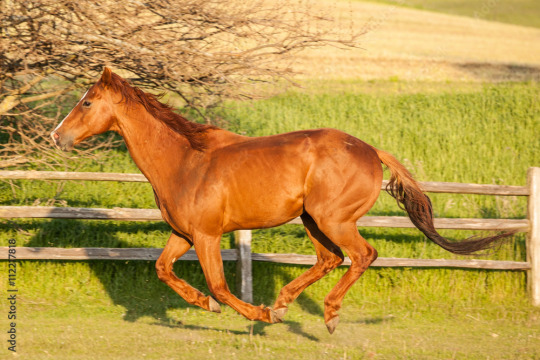
A plain black-based horse is a black horse.
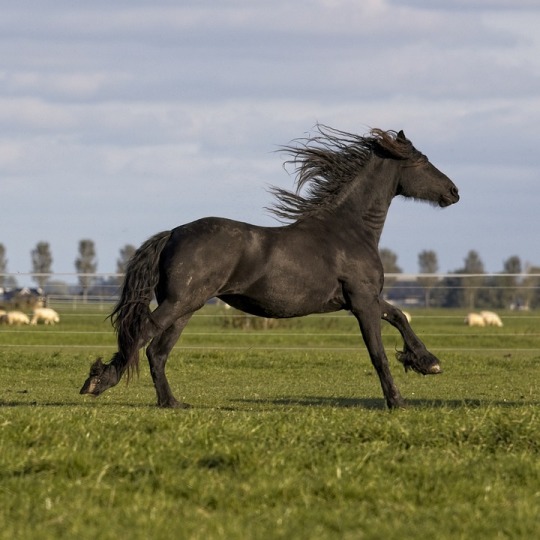
Easy, right?
Genetically speaking, the choice between a black or a chestnut is controlled by the Extension gene, represented as E/e. A black horse is created when the genetics are either EE or Ee, as the Extension gene is dominant. A chestnut horse can only be ee, the regressive form with no black hair expression.
However, black horses are actually not that common, relatively speaking. Most horses are some form of chestnut, ee, or a bay.

The bay horse is a variation on a black base. They have black manes and tails, black on their legs, and red or brown bodies. A bay horse is created by the Agouti gene (A/a), which changes the expression of the Extension gene (E/e). So a horse with EE AA will be a bay horse, like above. A horse with Ee Aa will also be a bay horse, exactly the same. In order for a horse to be black, they must have a dominant Extension gene and a regressive Agouti gene, EE aa or Ee aa.
Chestnut horses have no black in their coat, so the Agouti gene cannot affect them. They can be carriers, however, and make a bay horse when paired with a black horse. A chestnut horse could be ee aa, ee Aa, or ee AA, and look completely the same.
Congradulations, you now know horse color genetics! Now for the fun ones.
Dun Genes
If you've ever seen Spirit, Stallion of the Cimarron, you know this color
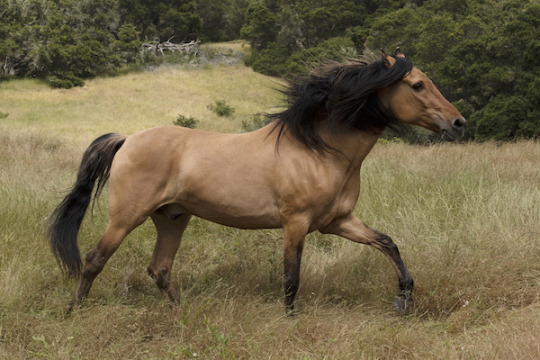
^This is the actual colt that Dreamworks animators modeled from!
Dun (D/nd1/nd2) is a gene that modifies all base coat colors. It can modify black, creating a black dun/grullo horse, it can modify bay, creating a bay dun, and it can modify chestnut, creating a red dun. In all of these variations, the body of the horse is lightened, the mane, tail, and legs are dark, and the horse has 'primitive' markings, including an eel stripe down the back, darker face, and leg bars.
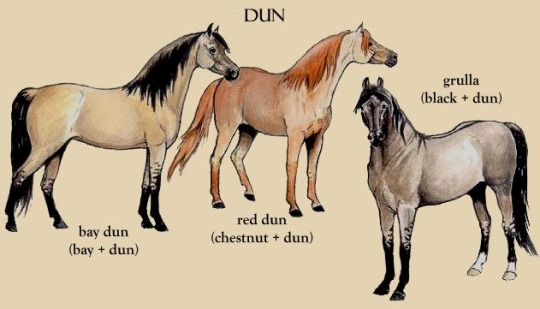
If you notice, dun has three variations! D is the dominant form, so any horse with D is a dun of some kind. Nd1 is a variant in the same gene that gives the horse similar markings, but it is not dun, and will be over powered by the dominant D version. Nd2 is a horse with no dun factor, so no markings or lighter coat. Dun horses can be D/D, D/nd2, D/nd1. A horse with non-dun factor (and look similar to a dun) can be nd1/nd1 or nd1/nd2. A bay, black, or chestnut horse will be nd2/nd2.
Cream Gene
Another gene diluting color is the cream gene, which you may know from the famous horse of Roy Rogers, Trigger
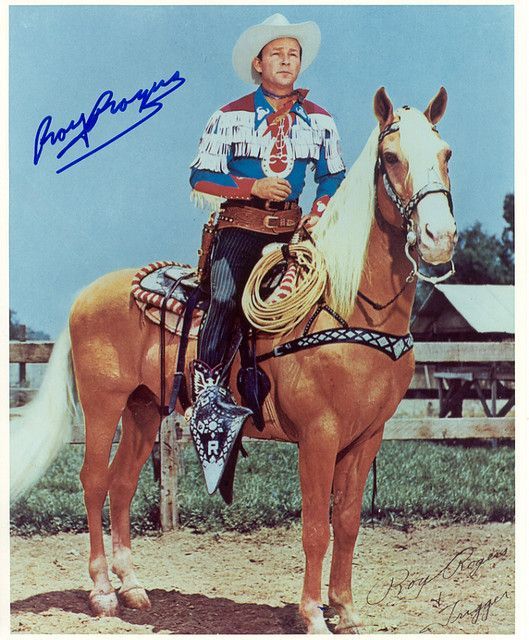
Trigger is a beautiful example of a palomino, a red-based cream dilute. As you can see, Trigger has a pale mane and tale and a gold colored body. Cream (Cr/Prl/-) is a dilution gene, or a hypomelanism gene, meaning it prevents red color in horse hair. Any red on a horse will be lightened. Chestnut horses, being all red, will have their entire bodies, mane, and tail lightened. Bay horses, with red hair only on their bodies, will have the body lightened, but the black mane, tail, and legs stay black, creating a buckskin horse
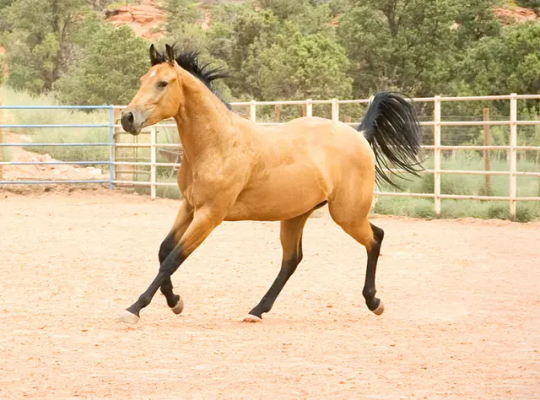
But wait! That horse looks exactly like the bay dun horse! Yes. Yes they do. However, buckskins do not have eel stripes, leg bars, or darker heads, and are a completely different gene. In fact, you can mix the two get a cream dun (Dunskin). It might be a slightly lighter dun.
Because a black horse has no red, black horses with the Cream dilute stay black, IF they have only one version (Ee aa Cr). Cream is an incomplete dominant gene, meaning that two versions makes the effect of the gene even stronger. Double creme dilutes are Cremellos, and they are very pale (but not white!)
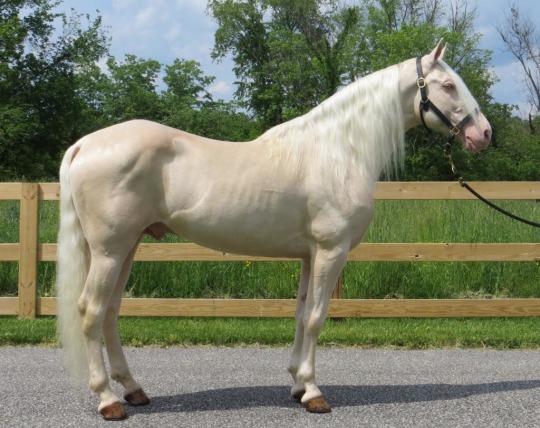
The double creme dilute overrides all the other genes. They are still there, but the horse is so pale, you can't see them. A variation of this color is the perlino, a horse with a recessive dilute gene called Pearl (Prl/-)
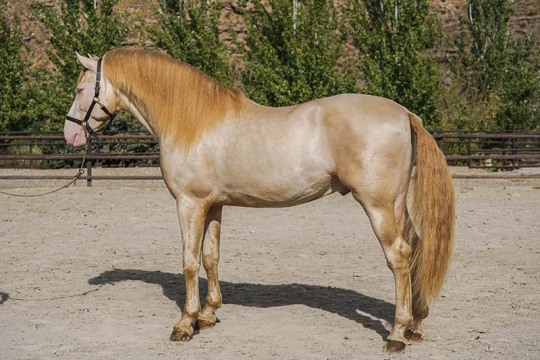
Pearl is recessive, meaning that one copy does not change the horse's coat. Two copies creates the perlino, and because Pearl is on the same gene as Cream, a false cremello can be created by a horse with one cream gene and one pearl gene. Crazy, right?
Now, there are so many more genes, but lets skip ahead to some patterns.
Horse Patterns
These are technically not colors, but rather genes that selectively turn off color in certain areas to create a coat pattern in horses. The most important of these are Tobiano, Frame, and Appaloosa genes.
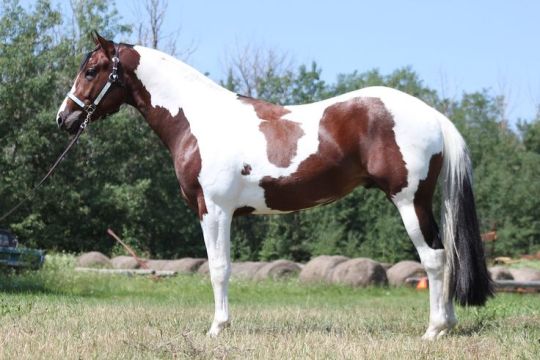
Tobiano is the gene for the coats of Paint horses (a color breed with a registry) and one of the genes for pinto horses. Pinto means any horse with large splashes of white, which includes the Frame gene, also known as Overo.

Both of these horses are Pintos, but only the lower one is an American Paint Horse, or Paint, and the top one has the Tobiano gene (TO), while the bottom has the Frame gene (O). A horse can be double Tobiano (TO/TO), Tobiano and Frame (known as Tovero) (TO/O), but a double Frame horse will die an early and painful death, due to Lethal White Factor.
Lethal White Overo is when two Frame horses are bred together and the foal receives the O gene from both parents. The foal can survive birth, but has malformations of the intestines that are incompatable with life. ALL affected horses die within days of birth.
Appaloosa horses are a very interesting horse. Technically, Appaloosa refers to a breed, developed by the Nez Perce tribe in the Pacific Northwest. Appaloosa is thought to come from "a Palouse horse", the name of a major river in the tribe's area. When the tribe was forced on a reservation, most of the horses were slaughtered or given to local white settlers, leading to many Appaloosa horses becoming merged to the Quarter Horse breed. As a result, most people use it as a color term.
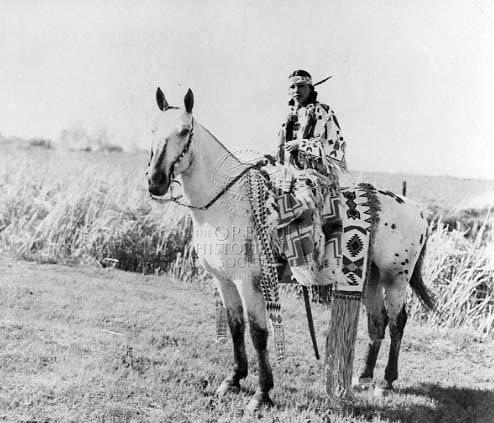
Nancy Wak Wak (Umatilla) on an Appaloosa, 1937. Oregon Historical Society Research Library, 018041
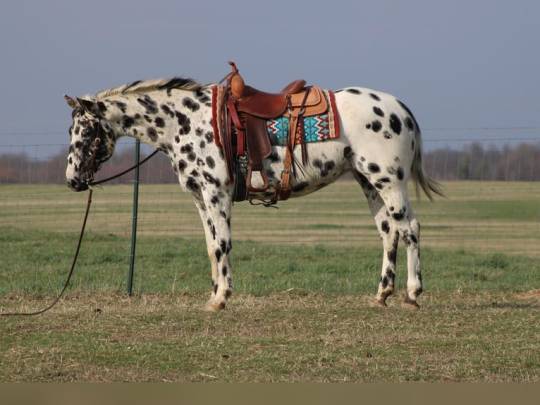
The genes responsible for the Appaloosa pattern is the Leopard Complex, controlled by an incomplete dominant gene (Lp/-), which turns on the complex when present, and turns it off when absent. Several other genes control the amount of white, the type of white, how big the spots are, ect. One Lp turns the complex on, but two Lps creates a mostly white blanket, or a fewspot coat.
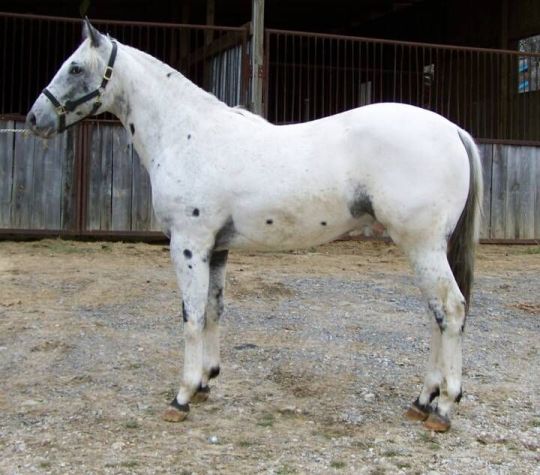
This horse has double Lp. The horse above it has one Lp, creating the many spotted coat.
Not all spotted horses are Appaloosas! In Denmark, the Knabstrupper is a breed of horse with no relation to the Appaloosa, but with the same gene creating the same spotted coat. Completely different breed, different origins, but same genes.
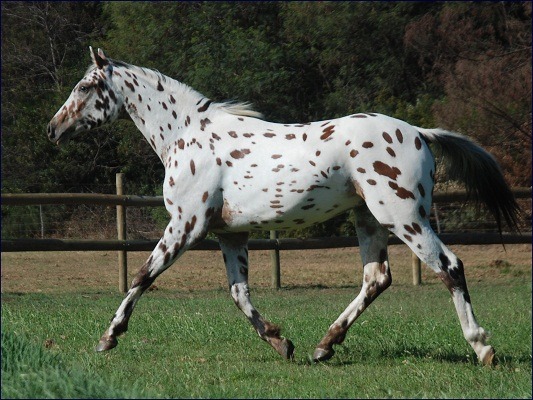
In all of these patterns, the pattern can be maximal, or very visible, or minimal, and not visible at all. A horse can look solid colored, but be hiding a pattern gene. So if you want to make babies, test your horse's genetics first! You do not want to accidentally cause a genetic deficiency.
Finally, the famous white horse.
Grey and White Horses
Most 'white' horses are actually grey. White horses are very rare. Grey horses are called grey because they are born with a colored coat, but because of the Grey gene (G/g) they lose color as they get older. Grey horses go through many colors throughout their lives.
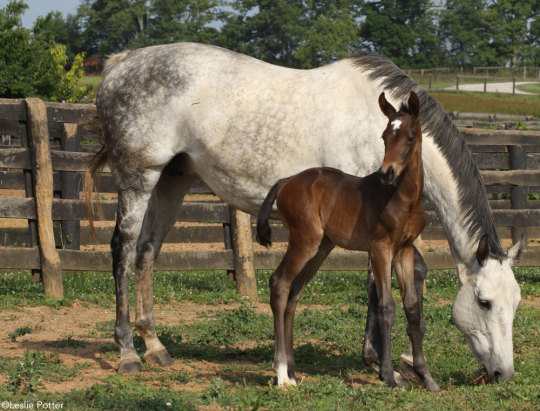
A grey foal and grey mother. Babies are born with the base color visible, but lose it as they age.
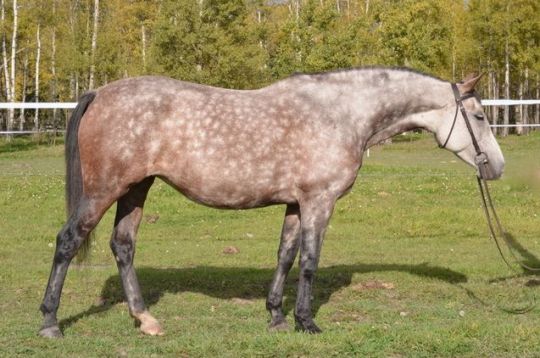
A dapple grey horse in the process of losing its baby coat.
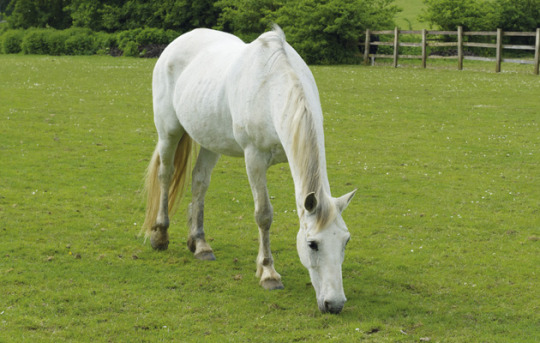
A fully greyed-out horse at adulthood. Even all grey, the skin around it's eyes and nose is still black, because the skin underneath has not lost color, only the hair.
A white horse is born white, will always be white, and is never naturally any other color. The skin of a white horse is pink, because it, like the hair, does not have color.

Sodashi is a Japanese racehorse and a member of a super-rare white horse family. Several members of her family are pure white, due to a mutation that gives them extreme white pattern, much like with the Tobiano gene. Her relative, Buchiko, shows the minimal pattern that gives them their white color.
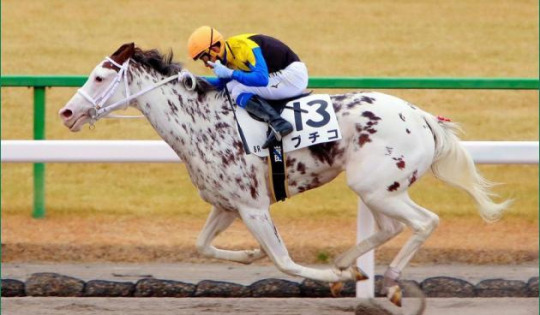
Same pattern, but maximal and minimal expression!
#writing reference#writeblr#writers on tumblr#writing life#creative writing#writing#novel writing#on writing#writerscommunity
252 notes
·
View notes
Text
things I have coming up for this blog, just a list for myself and for others who are looking forward to my content;
How to Write Realistic Relationships; Queer Romance Edition-- an article on Queer romance tropes, how to subvert them, why we like stereotypes and why we NEED to break them.
Let's Get Toxic-- an entire multipart series on how to write toxic or problematic tropes WITHOUT feeding into the larger miasmasphere (and maybe even how to create catharsis for yourself and your readers in the process), discusses Age Gaps, Mental Health, Emotional Abuse, Trauma and Recovery and Addictions. Those are the things I know how to discuss, and I welcome other writers to contact me to submit articles on other topics as well
Research, Research, Research; How to Find What You Are Looking For and When to Use It --- an article discussing research methods, how to gather data, how to apply that data and when to ignore it, for AUTHORS.
How to Create Your Own Symbolism series---- articles on the specific symbolism of Color Language, Flowers, Time and Place Settings, Physical Character Appearances and More, and how to adjust those things to fit inside your author's voice and what you want to express
Pacing, More Than Just A Race--- an article on how to pace your plot AND scenes to make them more compelling, when to speed up and when to slow down, and how to do the opposite for maximal effect
Writing For You and Your Reader --- an article discussing how to secure yourself in your work, and how to consider your readers without damaging your plot, your creativity or your voice.
Community in Collaboration--- an article discussing how to engage with your community as both an author and a reader, how to consider collabrative works and approach discussions, when to organize events and how to promote them, and what makes a good beta reader as well as what drives them away from an author.
#rowanwrites#on writing#creative writing#just a bunch of upcoming stuff which I am looking forward to sharing and will link here when each is done
2 notes
·
View notes
Text

#lmaooooo#someone save him hes drowning#or dont let him suffer#make him hurt#nickcore#frissonfic#frissonmemes#rochellecore
0 notes
Text
600+ Personality Traits
as reference for your next poem/story
Positive Traits
Accessible - easy to speak to or deal with
Active - disposed to action; energetic
Adaptable - capable of being or becoming adapted (i.e., suited by nature, character, or design to a particular use, purpose, or situation)
Admirable - deserving the highest esteem
Adventurous - disposed to seek adventure or to cope with the new and unknown
Agreeable - ready or willing to agree or consent
Alert - watchful and prompt to meet danger or emergency
Allocentric - having one's interest and attention centered on other persons
Amiable - friendly, sociable, and congenial
Anticipative - given to anticipation (i.e., the act of looking forward)
Appreciative - having or showing appreciation (i.e., a favorable critical estimate)
Articulate - expressing oneself readily, clearly, and effectively
Aspiring - desiring and working to achieve a particular goal
Athletic - characteristic of an athlete; vigorous, active
Attractive - arousing interest or pleasure; charming
Balanced - being in a state of balance; having different parts or elements properly or effectively arranged, regulated etc.
Benevolent - marked by or disposed to doing good
Brilliant - distinguished by unusual mental keenness or alertness
Calm - free from agitation, excitement, or disturbance
Capable - having or showing general efficiency and ability
Captivating - charmingly or irresistibly appealing
Caring - feeling or showing concern for or kindness to others
Challenging - invitingly provocative; fascinating
Charismatic - having, exhibiting, or based on charisma (i.e., a special magnetic charm or appeal)
Charming - extremely pleasing or delightful; entrancing
Cheerful - full of good spirits; merry
Clean - pure; free from moral corruption or sinister connections of any kind; fair
Clearheaded - having or showing a clear understanding; perceptive
Clever - mentally quick and resourceful
Colorful - full of variety or interest
Companionable - marked by, conducive to, or suggestive of companionship; sociable
Compassionate - having or showing compassion; sympathetic
Conciliatory - intended to gain goodwill or favor or to reduce hostility
Confident - having or showing assurance and self-reliance
Conscientious - meticulous, careful
Considerate - thoughtful of the rights and feelings of others
Constant - marked by firm steadfast resolution or faithfulness
Contemplative - marked by or given to contemplation (i.e., an act of considering with attention)
Cooperative - marked by a willingness and ability to work with others
Courageous - having or characterized by courage; brave
Courteous - marked by respect for and consideration of others
Creative - having the quality of something created rather than imitated; imaginative
Cultured - cultivated (i.e., refined, educated)
Curious - marked by desire to investigate and learn
Daring - venturesomely bold in action or thought
Debonair - suave, urbane; lighthearted, nonchalant
Decent - marked by moral integrity, kindness, and goodwill
Decisive - resolute, determined
Dedicated - devoted to a cause, ideal, or purpose; zealous
Deep - of penetrating intellect; wise
Dignified - showing or expressing dignity (i.e., the quality or state of being worthy, honored, or esteemed)
Directed - having a positive or negative sense
Disciplined - marked by or possessing discipline (i.e., orderly or prescribed conduct or pattern of behavior)
Discreet - prudent; modest; unobtrusive
Dramatic - having or showing a tendency to behave or react in an exaggerated way
Dutiful - filled with or motivated by a sense of duty
Dynamic - energetic, forceful
Earnest - characterized by or proceeding from an intense and serious state of mind
Ebullient - having or showing liveliness and enthusiasm
Educated - having an education; skilled
Efficient - productive of desired effects
Elegant - of a high grade or quality; splendid
Eloquent - marked by forceful and fluent expression
Empathetic - involving, characterized by, or based on empathy (i.e., the action of understanding, being aware of, being sensitive to, and vicariously experiencing the feelings, thoughts, and experience of another)
Energetic - operating with or marked by vigor or effect
Enthusiastic - filled with or marked by enthusiasm (i.e., strong excitement of feeling)
Esthetic - artistic; appreciative of, responsive to, or zealous about the beautiful
Exciting - producing excitement (i.e., something that rouses)
Extraordinary - exceptional to a very marked extent
Fair - marked by impartiality and honesty
Faithful - steadfast in affection or allegiance; loyal
Farsighted - having or showing foresight or good judgment; sagacious
Felicific - causing or intended to cause happiness
Firm - not weak or uncertain; vigorous
Flexible - characterized by a ready capability to adapt to new, different, or changing requirements; tractable
Focused - a state or condition permitting clear perception or understanding
Forceful - possessing or filled with force; effective
Forgiving - allowing room for error or weakness
Forthright - free from ambiguity or evasiveness
Freethinking - thinking freely or independently
Friendly - showing kindly interest and goodwill
Fun-loving - lighthearted and lively
Gallant - nobly chivalrous and often self-sacrificing; spirited
Generous - liberal in giving; magnanimous
Gentle - free from harshness, sternness, or violence; docile
Genuine - free from hypocrisy or pretense; sincere
Good-natured - of a pleasant and cooperative disposition
Gracious - marked by kindness and courtesy
Hardworking - constantly, regularly, or habitually engaged in earnest and energetic work; industrious, diligent
Healthy - prosperous, flourishing
Hearty - enthusiastically or exuberantly cordial; jovial
Helpful - of service or assistance; useful
Heroic - exhibiting or marked by courage and daring
High-minded - marked by elevated principles and feelings; also: pretentious
Honest - genuine, real; marked by integrity
Honorable - deserving of respect or high regard; illustrious
Humble - not proud or haughty; unpretentious
Humorous - full of or characterized by humor; funny
Idealistic - of or relating to idealists or idealism (i.e., having a standard of perfection, beauty, or excellence)
Imaginative - given to imagining; having a lively imagination
Impressive - making or tending to make a marked impression; having the power to excite attention, awe, or admiration
Incisive - impressively direct and decisive
Incorruptible - incapable of being bribed or morally corrupted
Independent - not requiring or relying on others
Individualistic - pursuing a markedly independent course in thought or action
Innovative - characterized by, tending to, or introducing innovations (i.e., a new idea, method, or device)
Inoffensive - giving no provocation; peaceable
Insightful - exhibiting or characterized by insight (i.e., the power or act of seeing into a situation)
Insouciant - lighthearted unconcern; nonchalance
Intelligent - guided or directed by intellect; rational
Intuitive - possessing or given to intuition or insight
Invulnerable - immune to or proof against attack
Kind - of a sympathetic or helpful nature
Knowledgeable - having or showing knowledge or intelligence-
Leisurely - characterized by leisure; unhurried
Liberal - marked by generosity; openhanded; broad-minded
Logical - skilled in logic; analytic; capable of reasoning
Lovable - having qualities that attract affection
Loyal - unswerving in allegiance
Lyrical - having an artistically beautiful or expressive quality suggestive of song
Magnanimous - showing or suggesting a lofty and courageous spirit
Many-sided - having many sides or aspects; interests or aptitudes
Mature - based on slow careful consideration
Methodical - habitually proceeding according to method
Meticulous - marked by extreme or excessive care in the consideration or treatment of details
Moderate - avoiding extremes of behavior or expression; calm, temperate
Modest - decent; unpretentious
Multi-leveled - having a scale (as of difficulty or achievement) with multiple positions or ranks
Natural leader - a person who has qualities that a good leader has
Neat - habitually clean and orderly
Nonauthoritarian - not authoritarian (i.e., of, relating to, or favoring a concentration of power in a leader or an elite not constitutionally responsible to the people)
Objective - expressing or dealing with facts or conditions as perceived without distortion by personal feelings, prejudices, or interpretations
Observant - paying strict attention; keen; mindful
Open - characterized by ready accessibility and usually generous attitude; responsive
Optimistic - of, relating to, or characterized by optimism; feeling or showing hope for the future
Orderly - well behaved; peaceful; tidy
Organized - having a formal organization to coordinate and carry out activities
Original - independent and creative in thought or action; inventive
Painstaking - taking pains; expending, showing, or involving diligent care and effort
Passionate - capable of, affected by, or expressing intense feeling; enthusiastic
Patient - bearing pains or trials calmly or without complaint; not hasty
Patriotic - befitting or characteristic of a patriot (i.e., one who loves and supports his or her country)
Peaceful - untroubled by conflict, agitation, or commotion; quiet, tranquil
Perceptive - responsive to sensory stimuli; discerning; observant
Perfectionist - having a disposition to regard anything short of perfection as unacceptable
Personable - pleasant or amiable in person; attractive
Persuasive - tending to persuade (i.e., to move by argument, entreaty, or expostulation to a belief, position, or course of action)
Planful - full of plans; resourceful; scheming
Playful - full of play; frolicsome, sportive; humorous
Polished - characterized by a high degree of development, finish, or refinement; free from imperfections
Popular - commonly liked or approved
Practical - actively engaged in some course of action or occupation; useful
Precise - strictly conforming to a pattern, standard, or convention
Principled - exhibiting, based on, or characterized by principle (i.e., a comprehensive and fundamental law, doctrine, or assumption)
Profound - having intellectual depth and insight
Protean - displaying great diversity or variety; versatile
Protective - intended to resist or prevent attack or aggression
Providential - coming or happening by good luck especially unexpectedly; fortunate
Prudent - having or showing good judgment and restraint especially in conduct or speech; cautious
Punctual - being on time; prompt
Purposeful - full of determination
Rational - having reason or understanding; reasonable
Realistic - able to see things as they really are and to deal with them in a practical way
Reflective - marked by reflection; thoughtful, deliberative
Relaxed - easy of manner; informal
Reliable - suitable or fit to be relied on; dependable
Resourceful - able to meet situations; capable of devising ways and means
Respectful - marked by or showing respect or deference
Responsible - able to answer for one's conduct and obligations; trustworthy
Responsive - quick to respond or react appropriately or sympathetically; sensitive
Reverential - expressing or having a quality of reverence (i.e., honor or respect felt or shown; deference)
Romantic - having an inclination for romance; responsive to the appeal of what is idealized, heroic, or adventurous
Rustic - characteristic of or resembling country people
Sage - wise through reflection and experience
Sane - rational; able to anticipate and appraise the effect of one's actions
Scholarly - of, characteristic of, or suitable to learned persons; learned, academic
Scrupulous - having moral integrity; acting in strict regard for what is considered right or proper
Secure - trustworthy, dependable; assured in opinion or expectation; confident
Selfless - having no concern for self; unselfish
Self-critical - inclined to find fault with oneself; critical of oneself
Self-denying - showing self-denial (i.e., a restraint or limitation of one's own desires or interests)
Self-effacing - having or showing a tendency to make oneself modestly or shyly inconspicuous
Self-reliant - having confidence in and exercising one's own powers or judgment
Self-sufficient - capable of providing for one's own needs; haughty, overbearing
Sensitive - highly responsive or susceptible; delicate; touchy
Sentimental - marked or governed by feeling, sensibility, or emotional idealism
Seraphic - suggestive of or resembling a seraphim or angel
Serious - thoughtful or subdued in appearance or manner; sober
Sexy - sexually suggestive or stimulating; appealing
Sharing - to talk about one's thoughts, feelings, or experiences with others
Shrewd - marked by clever discerning awareness and hardheaded acumen
Simple - free from guile; innocent; modest; naive
Skillful - possessed of or displaying skill; expert
Sober - marked by temperance, moderation, or seriousness; calm
Sociable - inclined by nature to companionship with others of the same species; social
Solid - sound; reliable; serious in purpose or character
Sophisticated - finely experienced and aware; intellectually appealing
Spontaneous - controlled and directed internally; natural
Sporting - of, relating to, used, or suitable for sport
Stable - firmly established; enduring
Steadfast - firm in belief, determination, or adherence; loyal
Steady - not easily disturbed or upset; dependable
Stoic - not affected by or showing passion or feeling
Strong - extreme, intense; ardent; firm
Studious - assiduous in the pursuit of learning
Suave - smoothly though often superficially gracious and sophisticated
Subtle - delicate, elusive; obscure
Sweet - marked by gentle good humor or kindliness; agreeable
Sympathetic - given to, marked by, or arising from sympathy, compassion, friendliness, and sensitivity to others' emotions
Systematic - marked by thoroughness and regularity
Tasteful - having, exhibiting, or conforming to good taste
Teacherly - resembling, characteristic of, or befitting a teacher
Thorough - complete in all respects; having full mastery
Tidy - methodical, precise; neat and orderly
Tolerant - permitting or accepting something (such as a behavior or belief) that one does not like
Tractable - capable of being easily led, taught, or controlled; docile
Trusting - having or showing trust in another
Uncomplaining - accepting pains or hardships calmly or without complaint
Understanding - endowed with understanding; tolerant, sympathetic
Undogmatic - not dogmatic; not committed to dogma (i.e., something held as an established opinion)
Unfoolable -impossible to fool (i.e., deceive)
Upright - marked by strong moral rectitude
Urbane - notably polite or polished in manner
Venturesome - inclined to court or incur risk or danger; daring
Vivacious - lively in temper, conduct, or spirit; sprightly
Warm - secure; ardent; marked by or readily showing affection, gratitude, cordiality, or sympathy
Well-bred - having or displaying the politeness and good manners associated especially with people of high social class
Well-read - well-informed or deeply versed through reading
Well-rounded - fully or broadly developed
Winning - successful especially in competition; tending to please or delight
Wise - marked by deep understanding, keen discernment, and a capacity for sound judgment
Witty - marked by or full of clever humor or wit
Youthful - having the vitality or freshness of youth; vigorous
Neutral Traits
Absentminded - tending to forget or fail to notice things
Aggressive - marked by combative readiness
Ambitious - having a desire to be successful, powerful, or famous
Amusing - giving amusement; diverting
Artful - using or characterized by art and skill; dexterous
Ascetic - austere in appearance, manner, or attitude
Authoritarian - of, relating to, or favoring a concentration of power in a leader or an elite not constitutionally responsible to the people
Big-thinking - tendency to think about doing things that involve a lot of people, money, effort, etc.
Breezy - airy, nonchalant
Businesslike - serious, purposeful
Busy - full of activity; bustling
Casual - feeling or showing little concern; nonchalant; informal
Cautious - careful about avoiding danger or risk
Cerebral - primarily intellectual in nature
Chummy - quite friendly
Circumspect - careful to consider all circumstances and possible consequences; prudent
Competitive - inclined, desiring, or suited to compete (i.e., to strive consciously or unconsciously for an objective)
Complex - having many parts or aspects that are usually interrelated; complicated; intricate
Confidential - entrusted with confidences
Conservative - marked by or relating to traditional norms of taste, elegance, style, or manners
Contradictory - involving, causing, or constituting a contradiction (i.e., logical incongruity)
Crisp - concise and to the point; lively
Cute - attractive or pretty especially in a childish, youthful, or delicate way
Deceptive - tending or having power to cause someone to accept as true or valid what is false or invalid
Determined - characterized by determination (i.e., the act of deciding definitely and firmly)
Dominating - dominant; domineering
Dreamy - quiet and soothing; delightful, ideal
Driving - acting with vigor; energetic
Droll - having a humorous, whimsical, or odd quality
Dry - not showing or communicating warmth, enthusiasm, or tender feeling; uninteresting; plain; aloof
Earthy - practical, down-to-earth; unsophisticated
Effeminate - having feminine qualities untypical of a man
Emotional - markedly aroused or agitated in feeling or sensibilities
Enigmatic - of, relating to, or resembling an enigma; mysterious
Experimental - of, relating to, or based on experience or experiment; tentative
Familial - of or relating to a household or family; homey; domestic
Folksy - homespun; having or showing an unpretentious informality
Formal - following or agreeing with established form, custom, or rules
Freewheeling - free and loose in form or manner
Frugal - economical; careful in the management of money or resources
Glamorous - full of glamour; excitingly attractive
Guileless - innocent, naive
High-spirited - characterized by a bold or energetic spirit
Hurried - going or working at speed; hasty
Hypnotic - readily holding the attention
Iconoclastic - tendency to not conform to generally accepted standards or customs
Idiosyncratic - peculiar; eccentric
Impassive - unsusceptible to or destitute of emotion; apathetic
Impersonal - withdrawn; having or showing no emotional warmth or interest in others
Impressionable - inexperienced; easy to influence
Intense - extreme in degree, power, or effect; passionate
Invisible - discreet; not readily seen or noticed
Irreligious - lacking religious emotions, principles, or practices
Irreverent - lacking proper respect or seriousness
Maternal - of, relating to, belonging to, or characteristic of a mother; motherly
Mellow - pleasant, agreeable; laid back
Modern - being or involving the latest methods, concepts, information, or styles
Moralistic - characterized by or expressive of a narrow moral attitude
Mystical - impossible to prove, understand, or explain by either the senses or intelligence
Neutral - not decided or pronounced as to characteristics; indifferent
Noncommittal - having no clear or distinctive character
Noncompetitive - not inclined towards or characterized by competition or rivalry
Obedient - submissive to the restraint or command of authority; willing to obey
Old-fashioned - adhering to customs of a past era; outmoded
Ordinary - being of the type that is encountered in the normal course of events; normal
Outspoken - direct and open in speech or expression; frank
Placid - serenely free of interruption or disturbance
Political - involving or charged or concerned with acts against a government or a political system
Predictable - behaving in a way that is expected
Preoccupied - lost in thought and unaware of one's surroundings or actions; distracted
Private - preferring to keep personal affairs to oneself
Progressive - liberal; not bound by traditional ways or beliefs
Proud - feeling or showing pride
Pure - having exactly the talents or skills needed for a particular role; immaculate; innocent
Questioning - skeptical; inclined to doubt or question claims
Quiet - calm; gentle; easygoing
Religious - scrupulously and conscientiously faithful; zealous
Reserved - restrained in words and actions
Restrained - not excessive or extravagant
Retiring - reserved, shy
Sarcastic - given to the use of sarcasm; caustic
Self-conscious - conscious of one's own acts or states as belonging to or originating in oneself
Sensual - devoted to or preoccupied with the senses or appetites
Skeptical - relating to, characteristic of, or marked by skepticism (i.e., an attitude of doubt or a disposition to incredulity either in general or toward a particular object)
Smooth - amiable, courteous
Soft - lacking firmness or strength of character; feeble
Solemn - marked by grave sedateness and earnest sobriety
Solitary - not gregarious, colonial, social, or compound
Stern - having a definite hardness or severity of nature or manner; austere
Stolid - having or expressing little or no sensibility; unemotional
Strict - stringent in requirement or control
Stubborn - justifiably unyielding; resolute; mulish
Stylish - conforming to current fashion
Subjective - arising out of or identified by means of one's perception of one's own states and processes
Surprising - of a nature that excites surprise (i.e., a taking unawares)
Tough - capable of enduring strain, hardship, or severe labor
Unaggressive - not aggressive; not given to fighting or assertiveness
Unambitious - feeling or showing a lack of ambition (i.e., desire to achieve a particular end)
Unceremonious - not ceremonious; informal
Unchanging - constant, invariable
Undemanding - not requiring much time, effort, or attention
Unfathomable - incomprehensible; impossible to understand
Unhurried - not hurried; leisurely
Uninhibited - free from inhibition; boisterously informal
Unpatriotic - not feeling or showing love for or devotion to one's country
Unpredictable - tending to behave in ways that cannot be predicted
Unreligious - having no connection with or relation to religion; involving no religious import or idea
Unsentimental - not marked or governed by feeling, sensibility, or emotional idealism
Whimsical - characterized by whim or caprice; especially: lightly fanciful
Negative Traits
Abrasive - causing irritation
Abrupt - rudely or unceremoniously curt
Agonizing - causing agony (i.e., intense pain of mind or body)
Aimless - without aim or purpose
Airy - affected, proud
Aloof - removed or distant either physically or emotionally
Amoral - having or showing no concern about whether behavior is morally right or wrong
Angry - feeling or showing anger (i.e., a strong feeling of displeasure and usually of antagonism)
Anxious - characterized by extreme uneasiness of mind or brooding fear about some contingency; worried
Apathetic - having or showing little or no interest, concern, or emotion
Arbitrary - marked by or resulting from the unrestrained and often tyrannical exercise of power
Argumentative - given to argument; disputatious
Arrogant - exaggerating or disposed to exaggerate one's own worth or importance often by an overbearing manner
Artificial - imitation, sham
Asocial - not social; rejecting or lacking the capacity for social interaction
Assertive - disposed to or characterized by bold or confident statements and behavior; aggressive
Astigmatic - showing incapacity for observation or discrimination
Bewildered - deeply or utterly confused or perplexed
Bizarre - strikingly out of the ordinary
Bland - dull, insipid
Blunt - insensitive
Boisterous - noisily turbulent; tumultuous
Brittle - lacking warmth, depth, or generosity of spirit; cold
Brutal - cruel, cold-blooded; harsh
Calculating - marked by prudent analysis or by shrewd consideration of self-interest; scheming
Callous - feeling or showing no sympathy for others; hard-hearted
Cantankerous - difficult or irritating to deal with
Careless - negligent, slovenly
Charmless - unpleasant and without charm or interest
Childish - marked by or suggestive of immaturity and lack of poise
Clumsy - lacking tact or subtlety
Coarse - crude or unrefined in taste, manners, or language
Colorless - dull, uninteresting
Complacent - marked by self-satisfaction especially when accompanied by unawareness of actual dangers or deficiencies
Complaintive - prone to complain
Compulsive - of, relating to, caused by, or suggestive of psychological compulsion
Conceited - having or showing an excessively high opinion of oneself
Condemnatory - expressing strong criticism or disapproval
Conformist - following or seeking to enforce prevailing standards or customs; opposing or avoiding unconventional thinking and behavior
Confused - being perplexed or disconcerted
Contemptible - worthy of contempt (i.e., the act of despising)
Conventional - lacking originality or individuality; trite
Cowardly - being, resembling, or befitting a coward (i.e., one who shows disgraceful fear or timidity)
Crafty - adept in the use of subtlety and cunning
Crass - having or indicating such grossness of mind as precludes delicacy and discrimination
Criminal - guilty of crime; disgraceful
Critical - inclined to criticize severely and unfavorably
Crude - marked by the primitive, gross, or elemental or by uncultivated simplicity or vulgarity
Cruel - disposed to inflict pain or suffering; devoid of humane feelings
Cynical - having or showing the attitude or temper of a cynic (e.g., contemptuously distrustful of human nature and motives)
Decadent - characterized by or appealing to self-indulgence
Deceitful - deceptive, misleading
Delicate - weak, sickly; fragile
Demanding - requiring much time, effort, or attention; exacting
Dependent - relying on another for support
Desperate - having lost hope; suffering extreme need or anxiety
Destructive - designed or tending to hurt or destroy
Devious - not straightforward; deceptive
Difficult - hard to deal with, manage, or overcome
Dirty - morally unclean or corrupt
Disconcerting - causing embarrassment
Discontented - dissatisfied, malcontent
Discouraging - causing someone to feel less confident or less hopeful
Discourteous - lacking courtesy; rude
Dishonest - characterized by lack of truth, honesty, or trustworthiness; unfair, deceptive
Disloyal - showing an absence of allegiance, devotion, obligation, faith, or support
Disobedient - refusing or neglecting to obey
Disorderly - engaged in conduct offensive to public order
Disorganized - lacking coherence, system, or central guiding agency
Disputatious - inclined to dispute; controversial
Disrespectful - showing a lack of manners or consideration for others
Disruptive - disrupting or tending to disrupt some process, activity, condition, etc.
Dissolute - lacking restraint
Dissonant - marked by dissonance; discordant; incongruous
Distractible - when attention of the mind is easily distracted by small and irrelevant stimuli
Disturbing - causing feelings of worry, concern, or anxiety
Dogmatic - characterized by or given to the expression of opinions very strongly or positively as if they were facts
Domineering - inclined to exercise arbitrary and overbearing control over others
Dull - tedious, uninteresting
Egocentric - self-centered, selfish
Enervated - lacking physical, mental, or moral vigor
Envious - feeling or showing envy (i.e., painful or resentful awareness of an advantage enjoyed by another joined with a desire to possess the same advantage)
Erratic - characterized by lack of consistency, regularity, or uniformity
Escapist - relating to avoiding an unpleasant or boring life by thinking, reading, etc., about something more exciting or fun, especially something that could not really happen
Excitable - capable of being readily roused into action or a state of excitement or irritability
Expedient - governed by self-interest
Extravagant - lacking in moderation, balance, and restraint
Faithless - not to be relied on; untrustworthy; disloyal
False - not genuine; intentionally untrue
Fanatical - marked by excessive enthusiasm and often intense uncritical devotion
Fanciful - marked by fancy or unrestrained imagination rather than by reason and experience
Fatalistic - having or showing a belief that the future is determined and cannot be changed
Fawning - seeking or used to seek approval or favor by means of flattery
Fearful - causing or likely to cause fear, fright, or alarm especially because of dangerous quality
Fickle - marked by lack of steadfastness, constancy, or stability; given to erratic changeableness
Fiery - easily provoked; irritable
Fixed - firmly set in the mind
Flamboyant - excessively showy
Foolish - showing or marked by a lack of good sense or judgment
Forgetful - inclined to forget what one has learned or to do what one should
Fraudulent - characterized by, based on, or done by fraud; deceitful
Frightening - causing fear
Frivolous - marked by unbecoming levity
Gloomy - lacking in promise or hopefulness; pessimistic
Graceless - lacking a sense of propriety; immoral
Grand - lavish, sumptuous
Greedy - marked by greed; having or showing a selfish desire for wealth and possessions
Grim - ghastly, repellent, or sinister in character
Gullible - easily duped or cheated
Hateful - full of hate; malicious
Haughty - blatantly and disdainfully proud
Hedonistic - devoted to the pursuit of pleasure
Hesitant - slow to act or proceed (as from fear, indecision, or unwillingness)
Hidebound - having an inflexible or ultraconservative character
High-handed - having or showing no regard for the rights, concerns, or feelings of others; arbitrary, overbearing
Hostile - marked by malevolence; having or showing unfriendly feelings
Ignorant - unaware, uninformed
Imitative - imitating something superior; counterfeit
Impatient - not patient; restless or short of temper especially under irritation, delay, or opposition
Impractical - not practical; impracticable; idealistic
Imprudent - lacking discretion, wisdom, or good judgment
Impulsive - prone to act on impulse
Inconsiderate - careless of the rights or feelings of others
Incurious - lacking a normal or usual curiosity; uninterested
Indecisive - not decisive; inconclusive; irresolute
Indulgent - willing to allow excessive leniency, generosity, or consideration
Inert - sluggish
Inhibited - not confident enough to say or do what one wants
Insecure - beset by fear and anxiety; not confident or sure
Insensitive - lacking feeling or tact
Insincere - not sincere; hypocritical
Insulting - giving or intended to give offense
Intolerant - unable or unwilling to endure
Irascible - marked by hot temper and easily provoked anger
Irrational - not using or following good reasoning
Irresponsible - having or showing a lack of concern for the consequences of one's actions
Irritable - easily irritated or annoyed
Lazy - disinclined to activity or exertion; not energetic or vigorous
Libidinous - having or marked by lustful desires; lascivious
Loquacious - given to fluent or excessive talk; garrulous
Malicious - having or showing a desire to cause harm to someone; given to, marked by, or arising from malice
Mannered - having an artificial or stilted character
Mannerless - lacking good manners; impolite
Mawkish - exaggeratedly or childishly emotional
Mealymouthed - not plain and straightforward; devious
Mechanical - without thinking about what you are doing, especially because you do something often
Meddlesome - given to meddling (i.e., to interest oneself in what is not one's concern)
Melancholic - tending to depress the spirits; saddening
Meretricious - superficially significant; pretentious
Messy - extremely unpleasant or trying; slovenly
Miserable - causing extreme discomfort or unhappiness; being likely to discredit or shame
Miserly - marked by grasping meanness and penuriousness
Misguided - led or prompted by wrong or inappropriate motives or ideals
Mistaken - wrong in what you believe, or based on a belief that is wrong
Monstrous - having the qualities of a monster (i.e., a threatening force; of unnatural or extreme wickedness or cruelty)
Moody - subject to moods; temperamental
Morbid - abnormally susceptible to or characterized by gloomy or unwholesome feelings
Muddleheaded - mentally confused; bungling
Naive - deficient in worldly wisdom or informed judgment; credulous
Narcissistic - of, relating to, or characterized by narcissism (i.e., egoism, egocentrism); e.g., extremely self-centered with an exaggerated sense of self-importance
Narrow - illiberal in views or disposition; prejudiced
Narrow-minded - not willing to accept opinions, beliefs, behaviors, etc. that are unusual or different from one's own; not open-minded
Negativistic - having an attitude of mind marked by skepticism especially about nearly everything affirmed by others
Neglectful - given to neglecting; careless, heedless
Neurotic - behaving strangely or in an anxious way, often because one has a mental illness
Nihilistic - holding a viewpoint that traditional values and beliefs are unfounded and that existence is senseless and useless
Obnoxious - odiously or disgustingly objectionable; highly offensive
Obsessive - excessive often to an unreasonable degree
Obvious - very noticeable especially for being incorrect or bad
Odd - differing markedly from the usual, ordinary, or accepted
Offhand - done or made offhand (i.e., without premeditation or preparation; extempore)
One-dimensional - lacking depth or complexity; superficial
One-sided - limited to one side; partial
Opinionated - firmly or unduly adhering to one's own opinion or to preconceived notions
Opportunistic - taking advantage of opportunities as they arise (e.g., exploiting opportunities with little regard to principle or consequences)
Oppressed - burdened by abuse of power or authority
Outrageous - violent, unrestrained; going beyond all standards of what is right or decent; deficient in propriety
Overimaginative - excessively imaginative (e.g., devoid of truth)
Paranoid - characterized by suspiciousness, persecutory trends, or megalomania; extremely fearful
Passive - lacking in energy or will; lethargic
Pedantic - narrowly, stodgily, and often ostentatiously learned
Perverse - turned away from what is right or good; corrupt
Petty - marked by or reflective of narrow interests and sympathies; small-minded
Pharisaical - marked by hypocritical censorious self-righteousness
Phlegmatic - having or showing a slow and stolid temperament
Plodding - proceed slowly or tediously
Pompous - having or exhibiting self-importance; arrogant
Possessive - manifesting possession or the desire to own or dominate
Predatory - inclined or intended to injure or exploit others for personal gain or profit
Prejudiced - resulting from or having a prejudice or bias for or especially against
Presumptuous - overstepping due bounds (as of propriety or courtesy)
Pretentious - characterized by pretension (e.g., making usually unjustified or excessive claims)
Prim - stiffly formal and proper; decorous; prudish
Procrastinating - habitually and/or intentionally putting off the doing of something that should be done
Profligate - wildly extravagant; shamelessly immoral
Provocative - serving or tending to provoke, excite, or stimulate
Pugnacious - having a quarrelsome or combative nature; truculent
Puritanical - : of, relating to, or characterized by a rigid morality
Reactionary - relating to, marked by, or favoring reaction; especially: ultraconservative in politics
Reactive - done in immediate response to something especially without thinking or planning
Regimental - of or relating to a regiment; dictatorial
Regretful - full of regret (i.e., sorrow aroused by circumstances beyond one's control or power to repair)
Repentant - experiencing repentance (i.e., the action or process of repenting especially for misdeeds or moral shortcomings)
Repressed - characterized by restraint
Resentful - full of resentment; inclined to resent (i.e., to feel or express annoyance or ill will at)
Ridiculous - arousing or deserving ridicule; extremely silly or unreasonable; absurd, preposterous
Rigid - inflexibly set in opinion
Ritualistic - stressing the use of ritual forms; adhering to or devoted to ritualism
Rowdy - coarse or boisterous in behavior; rough
Ruined - bankrupt, impoverished; devastated
Sadistic - taking pleasure in the infliction of pain, punishment, or humiliation on others
Sanctimonious - hypocritically pious or devout
Scheming - given to forming schemes; devious
Scornful - full of scorn; contemptuous (i.e., manifesting, feeling, or expressing deep hatred or disapproval)
Secretive - disposed to secrecy; not open or outgoing in speech, activity, or purposes
Sedentary - lazy; not doing or involving a lot of physical activity
Selfish - concerned excessively or exclusively with oneself
Self-indulgent - excessive or unrestrained gratification of one's own appetites, desires, or whims
Shallow - lacking in depth of knowledge, thought, or feeling
Shortsighted - lacking foresight
Shy - sensitively diffident or retiring; reserved
Silly - exhibiting or indicative of a lack of common sense or sound judgment; frivolous
Single-minded - having one driving purpose or resolve; determined, dedicated
Sloppy - slovenly, careless; disagreeably effusive (i.e., marked by the expression of great or excessive emotion or enthusiasm)
Slow - lacking in readiness, promptness, or willingness
Sly - lightly mischievous; roguish; furtive; dissembling
Softheaded - having or indicative of a weak, unrealistic, or uncritical mind
Sordid - marked by baseness or grossness; vile; meanly avaricious; covetous
Steely - harsh and threatening in manner or appearance
Stiff - stubborn, unyielding; harsh, severe
Strong-willed - very determined to do something even if other people say it should not be done
Stupid - marked by or resulting from unreasoned thinking or acting; senseless; vexatious, exasperating
Submissive - submitting (i.e., to yield oneself to the authority or will of another; surrender) to others
Superficial - concerned only with the obvious or apparent; shallow
Superstitious - of, relating to, or swayed by superstition (i.e., a notion maintained despite evidence to the contrary)
Suspicious - disposed to suspect; distrustful
Tactless - marked by lack of tact (i.e., a keen sense of what to do or say in order to maintain good relations with others or avoid offense)
Tasteless - having no taste; insipid; dull
Tense - feeling or showing nervous tension
Thievish - given to stealing
Thoughtless - lacking concern for others; inconsiderate; reckless
Timid - lacking in courage or self-confidence
Treacherous - likely to betray trust; unreliable
Trendy - marked by ephemeral, superficial, or faddish appeal or taste
Troublesome - difficult, burdensome; giving trouble or anxiety; vexatious
Unappreciative - not giving recognition or thanks for something
Uncaring - lacking proper sympathy, concern, or interest
Uncharitable - lacking in charity; severe in judging; harsh
Unconvincing - not convincing; implausible
Uncooperative - marked by an unwillingness or inability to work with others
Uncreative - lacking originality of thought; not productive of new ideas
Uncritical - showing lack or improper use of critical standards or procedures
Unctuous - having, revealing, or marked by a smug, ingratiating, and false earnestness or spirituality
Undisciplined - lacking in discipline or self-control
Unfriendly - not friendly (e.g., hostile, unsympathetic; inhospitable, unfavorable)
Ungrateful - showing no gratitude; making a poor return
Unhealthy - of a harmful nature; morally contaminated
Unimaginative - having or showing a lack of imagination or originality
Unimpressive - not attracting or deserving particular attention, admiration, or interest
Unlovable - incapable of inspiring love or admiration; not having attractive or appealing qualities
Unpolished - not polished (i.e., characterized by a high degree of development, finish, or refinement)
Unprincipled - lacking moral principles; unscrupulous
Unrealistic - not realistic; inappropriate to reality or fact
Unreflective - unthinking, heedless
Unreliable - undependable, untrustworthy
Unrestrained - immoderate, uncontrolled
Unstable - wavering in purpose or intent; vacillating; characterized by lack of emotional control
Vacuous - marked by lack of ideas or intelligence; inane
Vague - not thinking or expressing one's thoughts clearly or precisely; vacant
Venal - originating in, characterized by, or associated with corrupt bribery
Venomous - spiteful, malevolent
Vindictive - intended to cause anguish or hurt; spiteful; vengeful
Vulnerable - open to attack or damage; assailable
Weak - not firmly decided; not factually grounded or logically presented; ineffective, impotent
Weak-willed - not having the determination that is needed to continue with a difficult course of action
Willful - obstinately and often perversely self-willed
Wishful - according with wishes rather than reality
Zany - strange, surprising, or uncontrolled in a humorous way
Sources: 1 2 3
#character development#character building#writeblr#writing reference#creative writing#writers on tumblr#writing resources#original character
868 notes
·
View notes
Text
An Introduction to Small World Theory
aka my favorite theory to write with
I don't see this one talked about often, and I don't even know if its a real theory for literature or just something my mentor shared with us, but I am going to introduce you to it now if you have not considered it before.
Many books begin with two characters meeting for the first time. Often plot points, especially in romance, include meeting each other's extended social groups, friends and relatives, all of whom do not know the other party to any extent so they are forming opinons of each other for the first time.
But there are lots of pieces of media that work *because* the characters all know one another from the start, in a variety of ways. Consider the primarily comedic How I Met Your Mother or Friends. Often when a new character is introduced, the conflict or rising action of their introduction is pointing out their connection to another character where in the introducer did not know that the introducee knew an adjacent member of the party. This is a very direct way to use Small World Theory and is the most common.
But my mentor taught us a more subtle way, and it is my absolute favorite--- the indirect method. Consider this; in the place you live, you are only ever 3 people away from someone you know, whether its a friend or your doctor or a worker at the gas station you frequent. When you travel to a place you don't live (within your country/state of origin), you are generally still only about 7-10 people away from someone you know, potentially even less. Often these connections are not something we think about or even know about one another; a mutual friend who is important to one party but simple an acquaintance to the other can still make for compelling conflict if one is wronged by the other and the middle person has to consider which relationship is more important to them-- or they find out that this conflict exists, and it changes their perspective on one party.
The connection can be even more subtle than that. You can reveal a lie by indicating that one party seems familiar or alluring to another party, and then later explain to the reader that the liar seemed familiar because the pov character caught them in the lie BEFORE they knew who they were, witness-of-the-crime style, but this can be used for anything not just real crime. See, we observe other people's lives every day and barely notice, until something sticks out to us when we gain information we didn't have before. Perhaps the liar suggests they had a good relationship with an ex lover, but the MC witnessed the liar and their ex in an altercation outside a restraunt weeks before, only now realizing these two situations are connected.
Even further than that, you can give your characters a mutual motivation or development. Have one be taught by an influential teacher who later moves after the character has graduated and is again an influential figure for another character, giving them an intertwined sense of morality, or perhaps an inverse form because they were influenced by this character at different points in their lives. More options; you could make two characters familiar with one another in a way that the other characters don't immediately understand, to the point where it becomes almost bothersome, and they have to confront their nagging interest with a conversation, only to find out these characters they thought were just friends are actually blood relatives or co-workers, or even dating without anyone realizing.
These are all ways we can realistically create connections through individual characters in subtle ways, which is the meat of our theory, but what is the meal? What is the big picture? Make them all connected.
If Character A is connected to Character B then Character B must be connected to Character C who is connected to Character D and Character D connects back around to Character A. That is the 3-person adjancy we see in our real world. For maximum effect, rather than making these connections unique between each individual pair, instead have them all connected in different ways to a fifth Character E. If Character E is the ex lover of Character A, but also the co-worker of Character B, the acquaintance of Character C and the current lover of Character D, then you have motivational connections between all of these people around the same topic. If the conflict is that Character D and Character A are at odds, then Character B might be on the side of Character D due to their bond with their coworker, or they could be on Character A's side because they can't stand their co-worker. Character C might be annoyed that they're dragged into a situation about someone they barely know, or they could be a drama-hound who loves to eat up the details of other people's lives. Character B could be a gossip, Character D could be in an unwittingly abusive relationship, Character A could be an empowered victim, Character C could be an unbiased observer. All dancing around the same central point; how did Character E affect us?
Small World Theory explores the intimate connections that we have with other humans, even when we don't realize it. It helps us craft backstories for our characters that take place moment by moment, instead of years or decades at a time of doing the same thing. It begs the question; who do they know that's off screen and how would knowing that person affect the story? How can we make characters have rich, intriguing and complex lives without showing the reader every moment, every acquaintance, and without beating them in the head with exposition? Through connection. You don't even have to fully explain any of these connections, but knowing they're there can really change how you view your plot, your character's motivations and their personalities.
Always remember, write because it hurts if you don't.
til next time
#creative writing#rowanwrites#writeblr#on writing#writing tips#writers on tumblr#writing#writing advice#how to write#rowanteaches#ao3 writer#fanfic tips#novel writing#book writing
19 notes
·
View notes